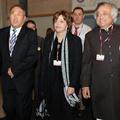 14日,130個來自開發中國家的談判代表步出議場,藉以抗議已開發國家試圖扼殺京都議定書。會議中斷期間的非正式談判向開發中國家保證,工業化國家並沒有在檯面下盤算著要收回減量承諾,這才暫時解決談判僵局。5小時後,包括來自中、印、巴西、南非等國家的代表回到議場,重啟談判議程。
14日,130個來自開發中國家的談判代表步出議場,藉以抗議已開發國家試圖扼殺京都議定書。會議中斷期間的非正式談判向開發中國家保證,工業化國家並沒有在檯面下盤算著要收回減量承諾,這才暫時解決談判僵局。5小時後,包括來自中、印、巴西、南非等國家的代表回到議場,重啟談判議程。
這場罷議行動是由於,今天的議程似乎將討論取消京都議定書中,對已開發國家排放限制的規定。為了表達開發中國家對此狀況的不滿,印度環境部長拉米西(Jairam Ramesh)及其他代表共同退席,向此屆會議主席--丹麥氣候暨能源部長海德卡兒(Connie Hedegaard)—表示抗議。
包含許多非洲國家在內的開發中國家,希望能延長京都議定書效期,然而此一目標並無受到富國的支持,特別是未簽署京都議定書的美國。美國氣候談判代表陶德史登(Todd Stern)對記者表示,美國絕對不會簽署京都議定書。
印度環境部長對「印度經濟時代」記者表示,該國絕不會同意以任何其他形式的協議取代京都議定書。過去的會議已決定要雙軌進行談判,也就是京都議定書及長期行動計劃(LCA)。這兩項談判最遲應該於2010年前做出結論。
周一回到會場後,非洲國家代表表示,他們越來越難參與,決定京都議定書未來的談判。
來自阿爾及利亞的非洲集團首席談判官迪傑墨依(Kamel Djemouai)表示,富國正試圖破壞協商程序。他在記者會上表示,除非解決了京都議定書相關議題,否則非洲集團將不會接受長期行動的非正式協商。
玻利維亞代表索蘭說,「會議主席海德卡兒宣稱參與非正式協商的國家將基於地域性考量,但她未指明如何挑選這些國家。已開發國家在檯面下製造非民主的程序,以允許他們挑選某些國家參與談判。」
United Nations climate negotiations have resumed in Copenhagen after delegates from some 130 developing countries, including China, Brazil, India, and South Africa, walked out to protest what they called an attempt to kill the Kyoto Protocol.
Informal talks assuring the developing countries that rich nations are not conspiring behind the scenes to reduce their commitments to limit greenhouse gases appear to have resolved the problem, at least for now.
The five hour suspension of talks came because today's agenda appeared to lead talks in the direction of canceling Kyoto Protocol limits on greenhouse gas emissions by rich nations.
To express their objections, Indian Environment Minister Jairam Ramesh, along with his counterparts, walked out to meet with Denmark's Minister of Climate and Energy Connie Hedegaard, who is presiding over the climate summit.
Developing nations, including many African nations, want to extend the Kyoto Protocol. But that approach does not have the support of wealthy countries, particularly the United States.
U.S. Special Envoy for Climate Change Todd Stern told reporters in Copenhagen December 9, "We are certainly not going to become part of the Kyoto Protocol."
Ramesh told "The Economic Times of India" that his government dismisses any suggestion of replacing the Kyoto Protocol with an alternative agreement. "The mandate enables (the) existing two track approach of the Kyoto Protocol and the Long-term Co-operative Action to move ahead. The two tracks must be completed by 2010 at the latest."."
On returning to the summit meetings today after a day-long break Sunday, the diplomats from African countries said it is becoming inceasingly difficult for them to take part in the talks on the future of the Kyoto Protocol.
"The developed countries are trying to collapse the negotiation process," said Kamel Djemouai of Algeria, chief negotiator of the Africa Working Group at a hurriedly called press conference at the Bella Center.
Djemouai said his group would not accept informal consultations on long-term actions unless the Kyoto Protocol issue is addressed first.
Bolivia's ambassador Pablo Solan said, "The presidency of the UNFCCC says that its informal consultations will be based on regional participation," he said, "but have not indicated how these will be chosen. They are creating an undemocratic parallel process where they can pick and choose only some countries."
全文及圖片詳見:ENS




